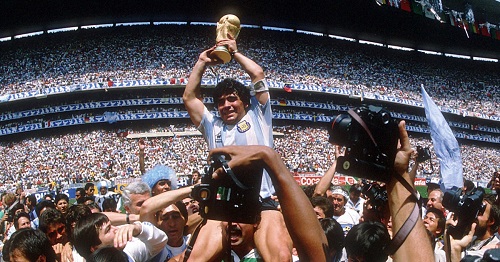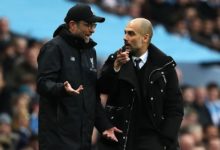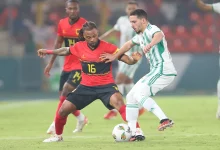
Argentina’s technical assistant Ruben Moschella and kit man Tito Benros were then charged with trawling around Mexico City to find a shirt suitable to play a World Cup quarter-final in. They narrowed it down to two, the first a similar colour to the existing kit and another in a brighter blue.
“Oh no, not that one,” said a visibly disgusted Bilardo, only to have the wind taken out of his sails when moments later Maradona walked in, pointed to it and announced: “What a nice shirt this is, Carlos. With this one we will beat the English.”
“OK,” said the coach, “let’s go with this one.”
And so it was that 24 hours before one of the most memorable games in football history, in an improvised workshop, kit men and Club America employees embroidered numbers on to the new bright blue shirts in a silver-grey fabric normally used by American football teams, and the coat of arms of the Argentine federation.
England’s plan was never to man mark Maradona, although the selection of Terry Fenwick – the no-nonsense central defender with a record number of yellow cards in a World Cup – certainly sent a message.
England manager Bobby Robson reportedly said to him: “Don’t worry Terry, he’s little, fat and he’s only got one foot.” Words that probably would have haunted him for the rest of his days.
Brown summed up the feelings of many of the Argentine players. “You get to the centre of the pitch and they play the national anthem and I’m telling you, it was like I put a knife between my teeth. I wanted to see if I could get revenge by winning a match,” he said.
“I left my normal life behind. And we all thought the same thing. We never talked about the problems of Las Malvinas, but we all transformed.”
For a game that will forever be remembered as one of the most significant of all time, it had a pretty mundane first half.
Then came a five-minute cameo where Maradona showed the world the two extremes of his on-pitch character: the cunning, opportunistic cheat and the untouchable, unplayable, footballing maestro. Knave or knight? Almost certainly both.
It was a performance that saw him transformed in the eyes of his nation from footballing genius to legend.
The infamous ‘Hand of God’ goal in the 51st minute followed an inadvertent volley from Steve Hodge that turned into a back pass when it flew high into the air.
It should have been Peter Shilton’s, but the goalkeeper reacted a crucial half second too late in going for the ball.
The advancing Maradona jumped for it first. In the air he shaped his body as if about to head the ball, then a fist thrust out and punched, sending it bouncing slowly into the open net.
Seemingly everyone saw the handball – everyone apart from Tunisian referee Ali bin Nasser and Bulgarian linesman BogdanDochev.
Dochev, having said he was convinced the goal was totally legal at the time, told a member of the refereeing commission just two days later that he had seen Maradona’s hand but didn’t disallow the goal because the referee had already awarded it.
Three and a half minutes after the controversy came the goal which to this day is described as one of the greatest goals ever scored. A goal that would never have happened had Bin Nasser blown the whistle for an obvious foul on Glenn Hoddle in the action that preceded it.
A mesmerising 10 seconds of brilliance played out as Maradona embarked on a mazy run from inside his own half that ended with him calmly slotting the ball into the net to put his side 2-0 up.
The game changed lives, not just for Maradona but also for his team-mates and many of his English opponents.
England’s hard-tackling centre-back Fenwick had set out to unsettle Maradona, only to see him come back on to the pitch after receiving treatment and breeze past him in the second half on his way to scoring what was dubbed the ‘Goal of the Century’.
Fenwick won 20 England caps and, barring 16 minutes in a friendly with Israel in February 1988, the quarter-final was his last full appearance for England. He later admitted the experience of England’s elimination from the World Cup in Mexico left him “bitter and twisted” for 20 years.
Had he not been booked early on in the game for fouling Maradona he would almost certainly have obstructed him outside the box rather than just brushing an arm across his stomach as he made his way ever closer to Shilton’s goal.
Maradona’s team-mate Hector Enrique would go on to become a national treasure in Argentina. The man who passed the ball to Maradona just before he set off on his hypnotizing dribble would later – tongue placed firmly in cheek – claim an assist adding: “With the quality of the pass that I gave him, if he had missed I would have killed him.”
England goalkeeper Shilton never forgave the number 10, not for committing the handball, he said, but for not apologising for it. He later refused to invite Maradona to his testimonial.
Maradona’s response was predictably acidic. “He didn’t invite me, true – oh, my heart bleeds! How many people go to a goalkeeper’s testimonial anyway? A goalkeeper’s?!”
Years later, Chris Waddle put the ‘Hand of God’ furore into perspective: “A lot of England fans will never forgive Maradona for what he did. But if Gary Lineker had done it at the other end, he’d still be hailed as a hero.”
England midfielder Hodge could never have imagined just how much swapping shirts with Maradona at the end of the match would affect his life. In that one action he guaranteed his future and that of his descendants. For 20 years the shirt was on loan to the National Football Museum in Manchester, then in May of this year it sold at auction for £7.1m, the highest fee ever paid for a piece of sports memorabilia.
Recently it was announced that the ball twice put into the net by Maradona was coming up for auction, where it is expected to sell for up to £3m.
The ball’s owner? Match referee Bin Nasser.
Next up was Belgium, the surprise package of the tournament.
Victory over England had left the Argentines feeling indestructible and the deadlock was broken on 51 minutes. A through ball from Jorge Burruchaga and a delightful lifted finish from the outside of Maradona’s left foot over the head of the advancing Belgian keeper Jean-Marie Pfaff set them on their way.
Then picking the ball up some 40 yards out, a straight run that eliminated three defenders and a change of direction put Argentina’s number 10 through and, before Pfaff could decide whether to stick or twist, Maradona struck it past him a second time.
Maradona’s brilliance had once again decided the outcome of the match. This time it had taken 12 minutes. After the best individual display ever seen in a football World Cup game, Argentina were in the final where they would meet West Germany.
For Maradona that was his quietest game of the knockout stages, though he would not be denied the final word.
Despite leading 2-0, Argentina let West Germany back into the game when goals from Karl-Heinz Rummenigge and Rudi Voeller levelled the match by 81 minutes.
Moments later, a bouncing ball landed in a busy centre circle. Maradona headed it to his right, then got it back. With two opponents closing him down and two others blocking his way ahead, he spotted Burruchaga about to launch a diagonal run on the right.
He let the ball bounce twice before threading through an inch-perfect pass to meet Burruchaga’s run. The striker’s third touch dispatched it into the bottom corner.
“He gave me the best pass of my career, the way only he can,” said Burruchaga. “I drew strength from I don’t know where to run those last metres.”
Once again Maradona’s decision making at the crucial moment would prove vital and ensured that the World Cup was going back to Argentina.
It was his fifth assist of a tournament where he had also scored five goals, meaning he had been actively involved in 10 of his team’s 14 goals and hit half of the total shots on target.
When they returned to their base the players held hands and took a lap of honour around the training ground.
That was the extent of their celebrations. The directors of the Argentine federation had not thought to organise anything beyond ensuring they had first class seats on their flight home, while their victorious team travelled in economy.
There should have been a happier ending.
The unbreakable bond that had been built between the squad – those brothers in arms – through the years gradually morphed into a strained, backbiting series of relationships.
Maradona went on to lead his country to the 1990 World Cup final in Italy, where they were beaten by West Germany. By then his career his cocaine addiction had taken hold and he was banned for 15 months in 1991 after testing positive for the drug. He captained his country again in the United States in 1994, but was sent home after failing a drugs test for ephedrine.
But in the summer of ’86, when he stepped on to the balcony at Casa Rosada with the World Cup in his hands – the same balcony from which Argentina’s former first lady Eva Peron had delivered her famous speech to her “beloved descamisados” [the poor] – Diego Armando Maradona knew that he had finally achieved his dream.
Never again would he be as happy as he was in that one moment. – AFP



